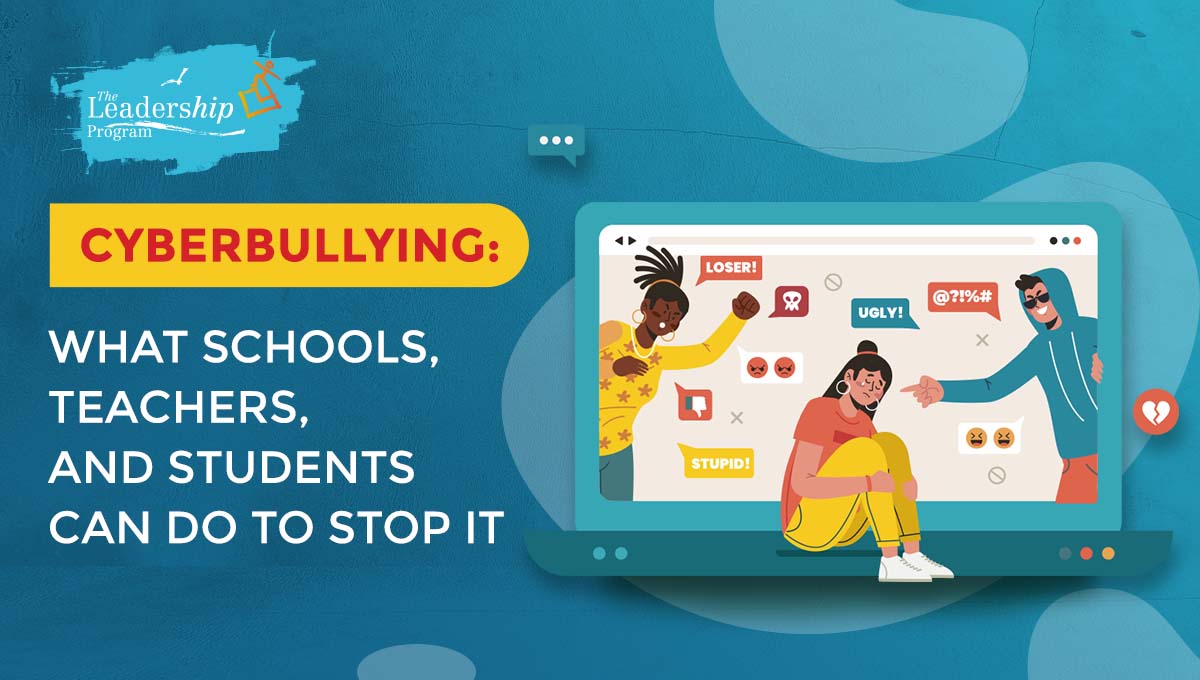
Cyberbullying is a form of bullying that relies on digital technology (online bullying) to threaten, scare, shame, or anger another person on a repeated basis. Bullying has always been an issue that schools, teachers, and students have contended with, but cyberbullying adds another dimension to an already serious problem. At times more covert, cyberbullying as a form of humiliation has potential for broadcasting to far more people than traditional bullying alone.
The effects of cyberbullying for victims are substantial. In the U.S. 59% of teens have reported being harassed or bullied online. It’s also been reported that 68% of teens that have a mental health condition have experienced cyberbullying. It’s a problem that teens, teachers, and school administrators recognize; however, it is not a problem that has been solved but affects the school climate and community.
Yet, schools have a responsibility to promote safety for students, and protecting the mental well-being of students falls within that mandate. It’s incumbent upon schools and teachers to find appropriate and effective ways for dealing with this ongoing problem. Here, we’ll explore what schools, teachers, and even students can do to stop cyberbullying.
What Can School Administrators Do to Stop Cyberbullying?
School administrators can do a lot to tamp down on the serious problem of cyberbullying. They have the resources needed to create a school-wide culture that promotes respect and positive treatment of others. Here are some steps that school boards and school administrations can take to reduce cyberbullying.

Consider Mental Health and Support
The problem of cyberbullying is twofold. Certainly, it’s essential to deliver consequences for students engaged in bullying behaviors. But it’s also important to support the victims of cyberbullying. Students may need counseling to cope with what’s happened to them.
Educate Parents, Teachers, and Students on the Issue
Administrators are also in a position to provide school community wide education on the topic of cyberbullying. To reduce or stop cyberbullying in their school community, they can steer resources, including monetary resources, to acquaint staff as well as students and their families with this problem.
Teachers will require education about how to spot the signs of cyberbullying and the steps to take to report it to school administration. School administrators can educate teachers by offering workshops for their staff delivered by organizations like The Leadership Program. These programs address the topic and offer proactive ways to deal with it based on experience and expertise.
Students need to be educated about what cyberbullying is and how they can be part of the solution to solve the problem. Families also require educating so they can spot the signs of cyberbullying.
When all involved parties receive education on the topic, they’ll have a framework to rely on when they are confronted by the issue either as an onlooker or as someone being victimized.
What Can Teachers Do to Stop Cyberbullying?
Teachers who are the adults on the front line with young people can help stop cyberbullying by investing their concern in the matter. In middle school and high school, teachers don’t typically have more than 45 to 60 minutes daily interaction with individual students. That means they don’t have the opportunity to get to know each student the way elementary classroom teachers do.
For this reason, it’s important for teachers to take extra initiative to get to know students so that they can spot signs of distress. Often, kids who are being harassed online are embarrassed and may not want adults to be aware of their struggles. If students won’t reach out, it’s incumbent on adults to reach out and get to the bottom of situations when students are upset. By being accessible, understanding, and an advocate for students, teachers can present themselves as an ally, a lighthouse in the storm of digital harassment.
What Students Do to Stop Cyberbullying?
There is considerable necessity to rely on students themselves to prevent and stop cyberbullying in its tracks. Often, students are well aware of who in their midst is bullying and who is being bullied. Often, it’s a friend. When the bully is a friend, it puts that student in a difficult spot, so education on the topic can provide an impetus for encouraging onlookers to report when they uncover cyberbullying.
Be an Upstander
Kids must understand the serious consequences of cyberbullying and what’s at stake when their peers are bullied online or anywhere else. Teen suicide and teen mental health are impacted by experiences of cyberbullying. Students must be willing to report instances of bullying in order to be productive members of their school community; in order to be good citizens. Teach students how to be Upstanders by encouraging students to support their friends and classmates.
Discuss Cyberbullying with Parents
Sometimes kids may not know whether or not to turn another student in for cyberbullying. That’s why it’s crucial to encourage kids to talk to their parents for advice. Involving parents is a necessary step when students don’t feel comfortable going to the school administration or a school staff member. Then, parents can contact the school and discuss the issue with appropriate staff.
Wrap Up
Cyberbullying is not a problem that is likely to go away on its own. Bullying and its various forms often result from unchecked aggression and, certainly, inappropriate ways of interacting with others. Both bullies and bullied students will need some type of support when cyberbullying occurs. Student bullies must understand the seriousness of their actions and learn how to manage the triggers that compel them to behave in these ways. As mentioned, students who’ve been bullied certainly warrant support to ensure that they are able to recover emotionally from what’s happened to them.
If you’re a school administrator, get in touch with us to learn more about our cyberbullying education topics. We can help your school community manage this issue and provide the support that students need.



Comments [0]
Click here to read/write comments